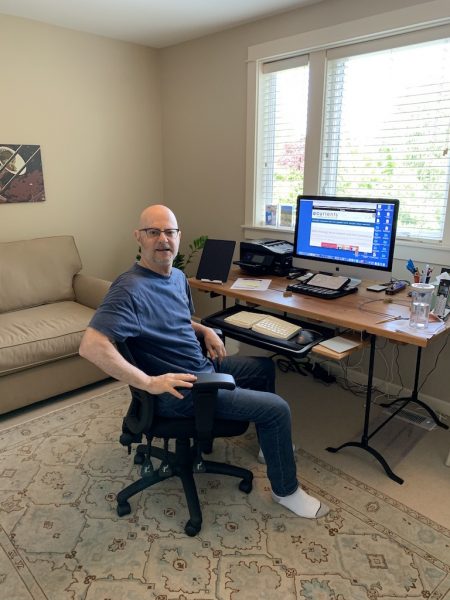I write for the same reason I breathe – because if I didn’t, I would die. – Isaac Asimov
Me, too, Isaac! That is pretty much why I have had to consistently write for the last several decades. It is how I process internal change and communicate that to others. I spent many hours late at night as a young teenager gazing through a telescope imagining the vastness of the cosmos and, by flashlight under the covers, reading science fiction stories by authors like Isaac Asimov. Both these activities embedded in me the dream of someday floating in outer space and becoming a writer. One out of two (so far)!
Isaac Asimov (1920 – 1992) was an American writer and professor of biochemistry at Boston University. He was known for his works of science fact and fiction. Asimov was a prolific author who wrote or edited more than 500 books and an estimated 90,000 letters and postcards.
In his Foundation series, a fictional character named Hari Seldon applies psycho-historical equations to predict major events that would occur tens of thousands of years in the future. This greatly appealed to my desire to alter my own future prospects. It might even have indirectly led to my willingness to explore an eastern life philosophy that emphasized the impact on our lives of the causes (karma) we create every day. I hoped it would enable me to understand the actions I needed to take to have a happier future. Ultimately, I discovered that meant changing from within to affect change from without. Fortunately, most of my dreams have come to fruition.
Asimov said, “There is a cult of ignorance in the United States, and there has always been. The strain of anti-intellectualism has been a constant thread winding its way through our political and cultural life, nurtured by the false notion that democracy means that my ignorance is just as good as your knowledge.” He also said, “The saddest aspect of life right now is that science gathers knowledge faster than society gathers wisdom.”
The last few years, in particular, I have been appalled by the number of people in the world who are willing to deny scientific facts. At the same time, if we are ever to bridge this divide, I know I need to dig deeper within myself to find compassion for these fellow human beings as reflected in this quote by the founder of the Charter for Compassion, Karen Armstrong: “In compassion, when we feel with the other, we dethrone ourselves from the center of our world and we put another person there.” When Armstrong says, “another person,” she isn’t only referring to those who think like I do.
Asimov mirrored a different aspect of this same struggle in his first law of robotics: “A robot may not injure a human being or, through inaction, allow a human being to come to harm.” I think people should follow the same rule. I’m hard-pressed to imagine the original founders of the major world religions disagreeing with this sentiment. Yet somehow, over thousands of years, this has too often been lost in translation.
We need to work together to get it back. Which means, in the words of my incredibly creative nephew, Adam Lisagor, “Consistency is awesome. But the ability to evolve is more awesome.” So, whatever your beliefs, let’s evolve toward a more peaceful and healthy planet. And, like good robots, do no harm!
Thanks for reading and stay safe out there!
Next week: Teenagers & the Coronavirus
Other titles by Mike during Covid-19:
Bobby McFerrin & the Coronavirus
Gilda Radner and the Coronavirus
Henrik Ibsen & the Coronavirus
A Remarkable Mender & the Coronavirus
Julie Andrews and the Coronavirus
Most Lucky One & the Coronavirus
Lily Tomlin & the Coronavirus
Herbie Hancock & the Coronavirus
Leo Tolstoy & the Coronavirus
Most Beautiful One & the Coronavirus
Grandma Moses & the Coronavirus
Leonardo da Vinci & the Coronavirus
Lean on Bill Withers and Defeat the Coronavirus
Gandhi, King, Ikeda & the Coronavirus
Tagore and the Coronavirus
Annie Leibovitz and the Coronavirus
Ansel Adams and the Coronavirus
Louise Penny and the Coronavirus
Harry Manx and the Coronavirus
Keb’ Mo’ and the Coronavirus
Davy Jones and the Coronavirus
Prince Hamlet and the Coronavirus
Helen Keller and the Coronavirus
Pema Chodron and the Coronavirus
 Image Courtesy of Michael Lisagor
Image Courtesy of Michael LisagorABOUT MIKE LISAGOR – Mike Lisagor plays harmonica and sings in Good Karma Blues. He has written hundreds of magazine articles and blogs on a variety of business and Buddhist related topics. He is the author of “Romancing the Buddha,” which he adapted into a successful one-man show that he performed at Bainbridge Performing Arts and in Los Angeles and Washington D.C. His nature photographs have appeared in the Boston Globe, Bainbridge Island Magazine, Living Buddhism as well as in several local galleries. His latest graphic art project, “Reimagined Nature”, is in the lobby of New Motion Physical Therapy.